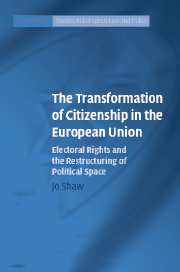 The Transformation of Citizenship in the European Union
The Transformation of Citizenship in the European Union Book contents
- Frontmatter
- Dedication
- Contents
- List of figures
- List of tables
- Preface and acknowledgments
- PART I Electoral rights in legal and political context
- PART II The past, present and future of EU electoral rights
- 4 The emerging constitutional framework for electoral rights in the era of European citizenship
- 5 EU electoral rights since 1993
- 6 Electoral rights for Union citizens: looking to the future
- 7 Electoral rights for third country nationals: what role for the European Union?
- PART III The contestation of electoral rights in the Member States of the European Union
- PART IV Conclusions
- Bibliography
- Index
7 - Electoral rights for third country nationals: what role for the European Union?
from PART II - The past, present and future of EU electoral rights
Published online by Cambridge University Press: 05 June 2015
- Frontmatter
- Dedication
- Contents
- List of figures
- List of tables
- Preface and acknowledgments
- PART I Electoral rights in legal and political context
- PART II The past, present and future of EU electoral rights
- 4 The emerging constitutional framework for electoral rights in the era of European citizenship
- 5 EU electoral rights since 1993
- 6 Electoral rights for Union citizens: looking to the future
- 7 Electoral rights for third country nationals: what role for the European Union?
- PART III The contestation of electoral rights in the Member States of the European Union
- PART IV Conclusions
- Bibliography
- Index
Summary
Introduction
In the previous chapter, we examined two key aspects of the debate about the material scope of EU electoral rights, highlighting where the potential might lie for an EU citizen to gain additional electoral rights when resident in a Member State other than the one of which he or she is a national, and emphasising the as yet untapped potential for European Parliament voting rights to reinforce the vertical dimension of Union citizenship. The focus shifts in this chapter to the debate regarding the personal scope. What scope is there for measures to be enacted at EU level to enhance the political participation of nationals of third countries resident in the Member States? Can, for example, the Member States be obliged under EU law to institute local electoral rights for third country nationals? Does the EU already have the relevant competence under the Treaties, and – if not – is it likely or even conceivable that the Treaties will be amended to make it possible for such measures to be adopted? More broadly, what is the scope for EU citizenship itself to be widened to encompass third country nationals as EU citizens, a change which would automatically have the effect of bringing them within the scope of Article 19 EC and its implementing directives? Would there be any prospect for change in that direction under the Constitutional Treaty, or by virtue of the application of the Charter of Fundamental Rights? In the absence of any powers of compulsion, whether now or in the future, to what extent does the EU already encourage Member States to adopt such rights by merely persuasive means?
This chapter will examine the manner in which these matters have thus far been debated across the EU institutions, the Member States, and – to a lesser extent – the associations and bodies of civil society (NGOs) which frequently intervene in the debate to argue for the extension of migrants' rights. One key question is whether, if the EU did have the competence to adopt such a measure, it should actually do so.
- Type
- Chapter
- Information
- The Transformation of Citizenship in the European UnionElectoral Rights and the Restructuring of Political Space, pp. 209 - 238Publisher: Cambridge University PressPrint publication year: 2007


